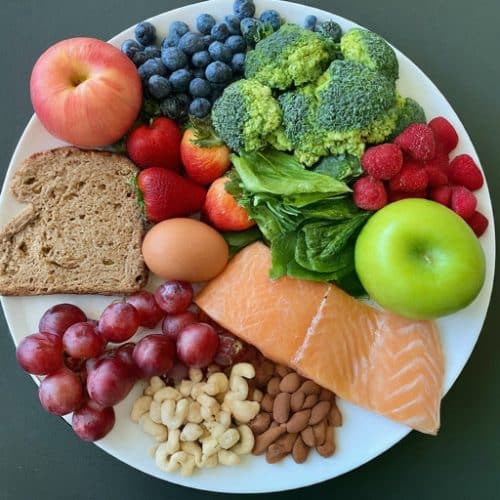Saffron – that bright, golden spice we often see in fancy dishes – is actually a hidden gem when it comes to health and wellness. It’s not just about adding a little flavour; saffron, known as the most expensive spice, is packed with antioxidants and nutrients that can do wonders for your body and mind.

A picture of saffron flower
From boosting your mood to giving your skin a healthy glow, this ancient spice has a lot more to offer than meets the eye. In this blog, we’re going to break down all the amazing ways saffron can benefit your health and show you how easy it is to add it to your everyday routine. Let’s dive in!
Saffron as a Powerful Antioxidant
Saffron is a robust antioxidant that harbours various beneficial compounds that may help combat various types of cancer. Antioxidants are crucial molecules that safeguard your cells against the adverse effects of free radicals and oxidative stress.
According to research, saffron is rich in several potent antioxidants, including:
- Crocin: This compound is chiefly responsible for saffron’s characteristic red hue. Studies hint at crocin’s potential antidepressant properties and protective effects on brain cells against progressive damage.
- Safranal: Research indicates that safranal may offer benefits for several health conditions, such as inflammation, asthma, hypertension, cancer, and depression.
- Kaempferol: Found in saffron petals, kaempferol can aid in boosting your immune system and guard your body against a variety of viruses.
These antioxidants synergistically work to protect your cells from oxidative damage, a main avenue leading to chronic diseases, including cancer and heart disease.
Mental Health Benefits
Enriched with compounds conducive to boosting mood, saffron has earned the moniker – the sunshine spice. It has the potential to alleviate the symptoms of mild to moderate depression and even equate the efficacy of some conventional treatments.
Saffron emerges as a favourable natural remedy for mental wellness, especially in individuals with mild cognitive impairment and Alzheimer’s disease. Below, we have discussed this in detail.
Improving Mood and Treating Depressive Symptoms
Saffron is known for its ability to improve mood and help treat depressive symptoms, offering a natural way to enhance mental well-being. The active compounds in saffron, such as crocin and safranal, help regulate serotonin levels in the brain, which play a key role in mood balance.
By supporting healthy brain function, saffron can promote feelings of happiness and reduce the effects of stress and anxiety. It serves as a gentler alternative to traditional treatments, providing a holistic approach to mental health without the common side effects. Whether used in meals or supplements, saffron can be a valuable addition to your wellness routine.
Another noteworthy benefit of saffron lies in its primary antioxidant, crocin. However, long-term human studies involving wider participants are requisite before endorsing saffron as a definitive treatment for depression.
Reducing Anxiety
Saffron exhibits potential therapeutic benefits, including the effects of saffron supplementation. Saffron also positively influences the balance of mood-boosting neurotransmitters in the brain. Notably, its components like crocin and safranal may increase dopamine, serotonin, and norepinephrine levels, providing an anxiety-soothing effect. Research has hinted at the impressive health potentials of saffron tea, such as reducing anxiety.
Dive into “The Good Mood Food” and discover how eating the right foods can lift your spirits and boost your well-being!
Physical Health Benefits
Saffron is more than just a flavourful spice; it offers a wide range of health benefits, both mental and physical. Beyond its mood-boosting properties, saffron can help with weight management by curbing appetite and promoting satiety. It also supports cardiovascular health due to its antioxidant-rich compounds, which may reduce the risk of heart disease.
For women, saffron has been found to alleviate PMS symptoms, providing relief from discomfort and mood swings. Let’s take a closer look at these incredible benefits and how saffron can contribute to your overall well-being.
Aiding Weight Loss and Appetite Control
Saffron has been linked to aiding weight loss and controlling appetite, making it a valuable addition to your wellness routine. Saffron may help boost serotonin levels, making you feel fuller and reducing calorie intake, which can support weight management. Adding saffron to your diet offers a natural way to help with your weight goals.
Reducing PMS Symptoms
Saffron may help reduce PMS symptoms, like mood swings and irritability. Its effects on serotonin and other neurotransmitters could contribute to the reduction of PMS-related issues. Incorporating saffron into your diet during this time may be beneficial for those seeking natural remedies for PMS symptoms.
Acting as an Aphrodisiac
Saffron is renowned for its aphrodisiac properties, enhancing libido and sexual function, which is beneficial for those experiencing erectile dysfunction. It stimulates the release of serotonin and dopamine, neurotransmitters involved in mood regulation and desire.
These compounds can promote intimacy and overall well-being. Saffron’s ability to improve blood flow and reduce oxidative stress also contributes to its aphrodisiac effects, supporting sexual health and vitality.
Boosting Heart Health
Saffron is renowned for its potential to boost heart health. Saffron’s antioxidant properties may help reduce risk factors associated with heart disease, including coronary artery disease.
By lowering blood pressure and total cholesterol levels, saffron could contribute to better heart health. Additionally, its impact on insulin sensitivity and lower blood sugar levels may further support cardiovascular well-being. Including saffron in your diet could be a flavourful way to enhance heart health and overall wellness.
Improving Sleep
Saffron has been linked to improving sleep quality due to its potential health benefits. Saffron may have positive effects on the nervous system, aiding in relaxation and enhancing sleep duration and quality. Its antioxidant properties may also help reduce oxidative stress and promote better sleep.
Adding saffron into your diet, whether through cooking or supplements, can help improve sleep and enhance overall wellness. It’s a natural, flavourful addition to your health routine that offers multiple benefits.
Saffron in Eye Health

A closeup shot of the human eye
Saffron is great for eye health, thanks to its powerful antioxidants like crocin and crocetin. These compounds help protect the retina from damage and age-related conditions like macular degeneration. Regularly consuming saffron can also improve your vision and overall eye function, making it a simple and natural way to keep your eyes healthy.
Saffron supplementation may reduce the risk of eye diseases and support overall eye health. Incorporating saffron into your diet can be a simple yet effective way to promote optimal vision.
Risks and Precautions of Saffron You Should Be Mindful Of
There are health benefits of saffron, but it’s important to be aware of potential risks. Let’s take a closer look at these risks and how to safely incorporate saffron into your diet.
Side Effects
- Allergic Reactions: Some people may experience allergic reactions, including skin rashes, swelling, or respiratory issues. If you have a known allergy to saffron or related plants, it’s best to avoid it.
- Blood Pressure Issues: Saffron can lower blood pressure, which may be problematic for those already on blood pressure medication or individuals with low blood pressure. It’s essential to monitor blood pressure levels regularly when using saffron.
- Digestive Problems: In high doses, saffron can cause gastrointestinal discomfort, including nausea, vomiting, or stomach upset. Stick to recommended dosages to avoid these effects.
- Pregnancy Concerns: While small amounts of saffron in food are generally safe during pregnancy, higher doses may pose a risk. Saffron has been traditionally used to induce labour, so pregnant women should consult a doctor before using saffron supplements or consuming it in large quantities.
- Interaction with Medications: Saffron may interact with certain medications, including antidepressants, blood thinners, and blood pressure medications. It’s important to talk to your healthcare provider if you’re taking any medication to avoid potential interactions.
Dosage Guidelines
It’s recommended to start with a low dose of saffron, around 30 mg daily, to gauge tolerance. For mood enhancement, doses of 30 mg to 100 mg have been used. However, higher amounts should be avoided without medical supervision as excessive intake may lead to adverse effects.
Consulting a healthcare provider before starting saffron supplementation is advised, especially for pregnant women or individuals with existing health conditions. Following proper dosage guidelines ensures this valuable spice’s safe and effective use.
Frequently Asked Questions
Is saffron safe to take daily?
Saffron extract is safe when consumed in moderate amounts daily. However, excessive intake can lead to side effects like nausea and dizziness. Following dosage guidelines and consulting a healthcare provider before incorporating it into your daily routine is essential.
What does saffron do to the brain?
There are different benefits of saffron, particularly its potential effects on the brain, including enhancing mood, memory, and cognitive function. It contains compounds that may protect against neurodegenerative diseases.
Are there any significant side effects of using saffron in cooking or supplements?
Saffron consumption, whether in cooking or as supplements, may lead to minor side effects like dizziness or dry mouth. Excessive intake could result in more serious issues, such as organ damage. It’s advisable to use saffron in moderation and consult a healthcare provider.
Who cannot take saffron?
Individuals with allergies to the plant family that saffron belongs to, pregnant women (due to the potential risk of miscarriage), and people on certain medications like blood thinners should avoid consuming saffron. Always consult a healthcare provider before adding saffron to your diet.
How to incorporate Saffron into your diet?
Simply steep saffron threads in warm water or milk to release their vibrant hue before incorporating them into your recipes. Classic dishes like paella or risotto benefit from saffron’s unique aroma and flavour, making it a luxurious addition to any meal.













1 comment
Thanks for sharing this amazing blog post. Experience the epitome of fine dining at Fancy Fork, the premier Restaurant in Regina. Immerse yourself in an atmosphere of sophistication as our culinary artisans craft exquisite dishes that blend local flavors with global inspirations, creating a culinary journey you won’t soon forget.